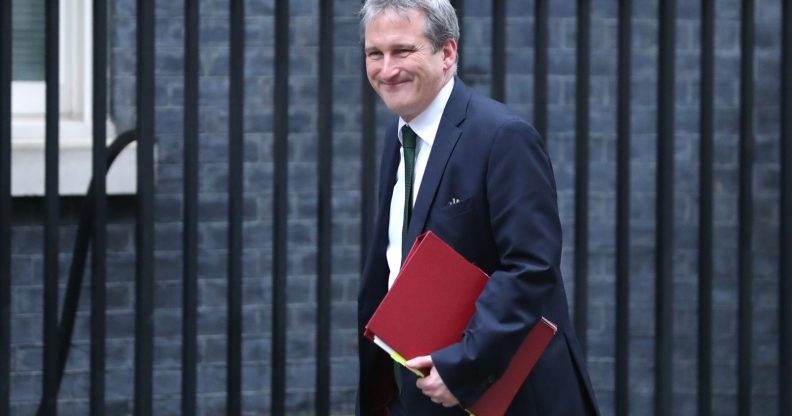LGBT-inclusive relationship and sex education taught from 2020

Britain’s Education Secretary Damian Hinds (Photo by DANIEL LEAL-OLIVAS/AFP/Getty Images)
Schools in England will teach LGBT-inclusive relationship and sex education starting 2020, the Department of Education announced on Monday (February 25).
The changes will be implemented as part of a reform of the school curricula which will add new subjects focusing on mental and physical health as well as relationship education.
The curriculum will adapt according to the pupils’ age—primary schools pupils will receive relationships education, while secondary school students will learn about relationships and sex education (RSE).
The sex education guidance has received its first update since 2000, discussing LGBT+ relationships and identities as well as issues such as sexting, FGM, and menstrual health.
A Department of Education spokesperson told PinkNews that, at primary school level, pupils will be taught about various family models, including same-sex families. At secondary school, the curriculum will address LGBT+ issues, including how damaging stereotypes, including those based sexual orientation or gender, can be.
Education Secretary Damian Hinds stated: “Almost twenty years on from the last time guidance on sex education was updated, there is a lot to catch up on.
“Although sex education is only mandatory to teach at secondary, it must be grounded in a firm understanding and valuing of positive relationships, and respect for others, from primary age. In turn positive relationships are connected with good mental health, which itself is linked with physical wellbeing. So it is appropriate to make health education universal alongside relationships and sex education.”
The Department of Education has set aside a £6 million budget for the following school year to ensure teachers will be prepared to handle the new subjects in September 2020. The Department for Education will also provide support to early-adopter schools who will start teaching the new content from September 2019.
Experts back need for LGBT-inclusive relationships and Sex education
The head of Ofsted, the government’s education watchdog, expressed support for LGBT sex and relationship education in an interview last week.
“It’s making sure they know just enough to know that some people prefer not to get married of someone of the opposite sex, and sometimes there are families that have two mummies or two daddies,” Ofsted Chief Inspector Amanda Spielman said.
The Royal College of Paediatrics and Child Health (RCPCH) had also backed the inclusion of LGBT issues in responding to the Department for Education (DfE)’s public consultation on changes to the Relationships Education and Relationship and Sex Education (RSE) curricula, which closed in November.
The doctors’ advice was not to shy away from teaching about sex education and LGBT+ issues, provided that educators address these topics in a “timely and developmentally-appropriate manner” for primary school pupils.

Andrew Moffat teaches LGBT+ education as part of his No Outsiders programme. (Varkey Foundation Global Teacher Prize/YouTube)
The announcement of the curriculum changes comes as teachers attending the NASUWT-The Teachers’ Union’s LGBTI Teachers’ Consultation Conference in Birmingham on Saturday (February 23) raised concerns that many schools are still failing to tackle anti-LGBT behaviour.
A poll of the conference participants indicated that only 1 in 3 of the school represented included same-sex relationships as part of its teachings on relationships and families, while half of respondents said they had witnessed some form of backlash when their school tried to teach pupils about LGBTI relationships and equality.
Chris Keates, General Secretary of the NASUWT, said in a statement: “Schools have a very important role to play in promoting LGBTI equality, which starts with ensuring the curriculum is inclusive and that a strong message is sent to the whole school community that homo/bi or transphobic abuse or bullying will not be tolerated.”
LGBT+ educator Andrew Moffat has faced backlash from a group of parents in Birmingham for teaching about LGBT+ relationships as part of his “No Outsiders” programme, launched in 2014, which teaches children about inclusivity and diversity.
As parents from various religious backgrounds voiced concerns about LGBT-inclusive education, 56 faith leaders wrote an open letter this month expressing support for providing LGBT+ education to raise awareness about discrimination and prejudice.

